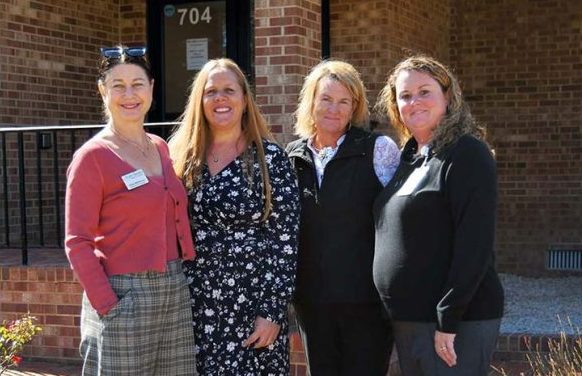
By The Outer Banks Voice
“Life is tough for a lot of people,” said Sheila Davies, Dare County Director of Health and Human Services (DHHS), explaining why Sound Minds, a new mental health collaborative program between Dare County Health and Human Services, Interfaith Community Outreach and the Outer Banks Relief Foundation is so important. “You’ve got chronic issues and then you have acute issues that you’re dealing with. It’s significant.”
To highlight its 40th anniversary, the Outer Banks Community Foundation announced in March that it would award a $40,000 special impact grant to address mental health and substance abuse issues on the Outer Banks.
“[We] did a series of meetings with community leaders…and asked them, ‘What are the biggest community needs?’” said Chris Sawin, President of the Community Foundation. “Mental health was on everybody’s list.” And that $40,000 grant went to Sound Minds.
Sound Minds brings together three organizations, the DHHS, Interfaith Community Outreach (ICO) and the Outer Banks Relief Foundation (OBRF) that have been working together for some time. The new organization will improve sharing of resources among the organizations.
“It’s something that’s been happening organically already,” said Patty McKenna, Executive Director of the OBRF. “I think that besides the infusion of more resources, more funds that’s coming from the Community Foundation, it’s a chance to message to the community that this has been going on there are places to turn if you would like some assistance.”
Those funds will be critical for providing the help people need. McKenna and her counterpart at ICO, Executive Director Jenniffer Albanese, emphasized that their organizations will do everything they can to support clients who need mental health services. Both organizations budget money for mental health support, but the funds are limited.
“We have a client at ICO that we’ve paid for mental health. She has no mental health capacity” in her health insurance, Albanese explained. “And we have spent $3,000 already on that mental health. We’re at our limit. I don’t have unlimited funds. And she needs a little bit more.”
In addition to creating a better funding source for mental health services, Sound Minds will also streamline a system that in the past, relied upon phone calls and personal conversations to find help for people in need.
“It’s been a piecemeal approach case by case,” Davies said. “Whereas now we’ll have a referral pipeline and process.”
Part of that referral pipeline is a simplified application for assistance that is shared by the three agencies. With questions and instruction in English and Spanish, the application is available online, and is modeled after the process Dare County used for registering people for the COVID vaccine.
Because of the experience the agencies have had helping people through difficult times, there was agreement that there had to be one simplified application.
DHHS Family Services Supervisor Leigh Brinkley referred to the aftermath of major weather events to describe what happens when national, state and even local agencies come to help, each with their own applications.
“Post-disaster, post-hurricane. We battle every time when all of these organizations come in and want to help us, but they all have their own application.” The victims have “already told their story and they’re sitting on a soggy couch, so they don’t really need to again,” she said.
Paying for the mental health services is at the heart of the Sound Minds mission and that is something the nonprofits have struggled to provide.
“There are multiple times a year when {Dare County] Social Services is helping a family,” McKenna said. “They identify a need for counseling. They even identify a counselor who has an opening and is ready to help. And the missing piece sometimes is paying the bill.”
The OBCF and ICO have each contributed an additional $5,000 to the fund, so the program is starting with $50,000. Although that may seem like a substantial investment in mental health support on the Outer Banks, it will help, but not solve the problem, according to Albanese.
“We’re probably going to cap it at $1,000 a person. Some might only [need three sessions] and some might be fourteen sessions,” she said, adding that “We’re not going to say, ‘okay, you’re done.’”
The partner organizations recognize the $40,000 or $50,000 is a good first step, but Albanese and McKenna are aware that there is a limit to how many people they can reach.
“We’ve estimated forty people. If we can impact forty people, that’s a huge difference,” Albanese said.
The issues confronting Sound Minds, however, are more than financial. There is a shortage of mental health providers in the area, and they haven’t been taking new patients. That has improved recently Davies noted.
“It’s opened up a little bit [in the] last month. A number of them said, ‘Yes, we can start accepting new patients,’” she said.
There is also a perception that there is shame or personal failure in asking for help during emotionally difficult times, Davies notes. But the hope is that as the process of seeking help becomes easier and more accepted, those perceptions will change.
“It’s okay to need mental health treatment,” Albanese said.
